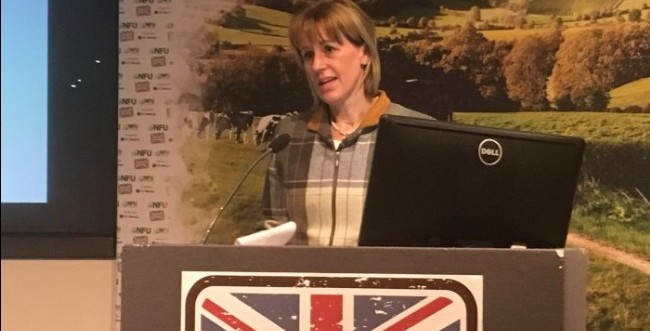NFU President Minette Batters has challenged the Government to show global leadership on international trade and insist that British farm standards are the benchmark for any food imports in future trade deals.
Speaking on the opening day of the NFU’s annual conference in Birmingham, Mrs Batters will highlight the gulf between the high animal welfare and environmental standards British farmers adhere to and the lack of equivalent regulation around the world.
New Defra Secretary George Eustice is due to appear at the conference on Thursday. Speaking on Sky News On Sunday, he fell short of pledging that the UK would not permit imports of products like chlorine-washed chicken in future trade deals.
“We won’t make any moves on our standards, we’ve got a clear position in this country that it is illegal to sell chlorine-washed chicken, illegal to sell beef treated with hormones, we have no plans to change those things,” he said.
He added that the US was unlikely to insist on chlorine-washed chicken being part of future trade deals, as the practice was no longer used. Lactic acid washes are more commonly used, he said.
In her speech, Mrs Batters will call for a more robust commitment from Government. “For the first time in decades this country has the opportunity to shape a trade, immigration and agricultural policy which will define our country for decades to come,” she will say.
“This year the government must show global leadership, insist that UK farm standards are the benchmark for climate-friendly farming around the world and that whoever wants to trade with us, trades on our terms.
“We must not allow those standards to be undermined by imports of goods which would be illegal for our farmers to produce here.
“In other parts of the world abattoirs use chlorine or other chemicals to wash carcases – this is not allowed in Britain because we have legislation on the way we keep our livestock which limits stocking density. We have rules on biosecurity, lighting, diet and veterinary oversight.
“In the US and other countries there are no federal controls on what are deemed in the UK to be fundamental welfare requirements.
“And in Japan, Australia, China, Canada, Brazil, Malaysia and India the use of antibiotics is permitted for growth promotion.
She insisted this was not just about chlorinated chicken, but about a wider principle. There are a number of differences in pig production standards between the UK and US, for example, including the use of feed additive ractopamine in the US, where sow stalls are still widely used and antibiotic use is higher.
Mrs Batters added: “We must not tie the hands of British farmers to the highest rung of the standards ladder while waving through food imports which may not even reach the bottom rung.
“If the government is serious about animal welfare and environmental protection and doing more than any previous government, it must put legislation in the Agriculture Bill.
“What is government waiting for? What is more important to our economy, our health and our environment than the very food that we eat?”




